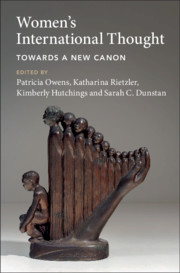Book contents
- Women’s International Thought: Towards a New Canon
- Women’s International Thought: Towards a New Canon
- Copyright page
- Contents
- Preface and Acknowledgments
- Introduction
- 1 Field and Discipline
- 2 Geopolitics and War
- 3 Imperialism
- 4 Anticolonialism
- From “Internationalisme noir” (1928)
- The Irish Republic (1937)
- From “To Joe and Ben” (1937)
- From White Man’s Duty (1942)
- From “The Colonial Question and the Destiny of the French People” (1943)
- From “Le grand camouflage” (1945)
- From African Journey (1946)
- From “The Caribbean Community in Britain” (1964)
- Jane Nardal
- Dorothy Macardle
- Una Marson
- Nancy Cunard
- Simone Weil
- Suzanne Roussy Césaire
- Eslanda Robeson
- Claudia Jones
- 5 International Law and International Organization
- 6 Diplomacy and Foreign Policy
- 7 World Peace
- 8 World Economy
- 9 Men, Women, and Gender
- 10 Public Opinion and Education
- 11 Population, Nation, Immigration
- 12 Technology, Progress, and Environment
- 13 Religion and Ethics
- Index
Simone Weil
from 4 - Anticolonialism
Published online by Cambridge University Press: 12 April 2022
- Women’s International Thought: Towards a New Canon
- Women’s International Thought: Towards a New Canon
- Copyright page
- Contents
- Preface and Acknowledgments
- Introduction
- 1 Field and Discipline
- 2 Geopolitics and War
- 3 Imperialism
- 4 Anticolonialism
- From “Internationalisme noir” (1928)
- The Irish Republic (1937)
- From “To Joe and Ben” (1937)
- From White Man’s Duty (1942)
- From “The Colonial Question and the Destiny of the French People” (1943)
- From “Le grand camouflage” (1945)
- From African Journey (1946)
- From “The Caribbean Community in Britain” (1964)
- Jane Nardal
- Dorothy Macardle
- Una Marson
- Nancy Cunard
- Simone Weil
- Suzanne Roussy Césaire
- Eslanda Robeson
- Claudia Jones
- 5 International Law and International Organization
- 6 Diplomacy and Foreign Policy
- 7 World Peace
- 8 World Economy
- 9 Men, Women, and Gender
- 10 Public Opinion and Education
- 11 Population, Nation, Immigration
- 12 Technology, Progress, and Environment
- 13 Religion and Ethics
- Index
Summary
We cannot say that colonization is a part of the French tradition. It is a process that had taken place outside of the life of the French people. The Algerian venture was on the one hand a matter of dynastic prestige; on the other, a part of Mediterranean security policy; as often happens, defense is transformed into conquest. Later, the acquisition of Tunisia and Morocco was – as one of those who played a great part in the latter remarked – largely the reflex of the peasant enlarging his patch of land. The conquest of Indochina was a reaction of revenge against the humiliation of 1870. Having been unable to resist the Germans, and taking advantage of temporary unrest, we compensated by depriving of its fatherland a people with an age-old tradition, peaceful and well organized. But Jules Ferry’s government carried out that act by an abuse of its powers and in open defiance of French public opinion; other aspects of the conquest were carried out by ambitious and amateurish officers who were disobeying the strict orders of their leaders.
- Type
- Chapter
- Information
- Women's International Thought: Towards a New Canon , pp. 220 - 223Publisher: Cambridge University PressPrint publication year: 2022



